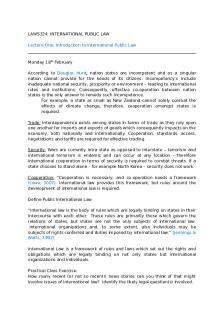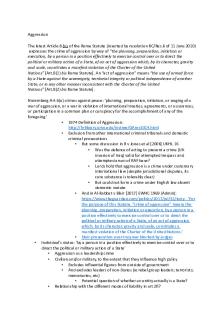18 International Economic Law PDF

| Title | 18 International Economic Law |
|---|---|
| Course | Public International Law |
| Institution | Durham University |
| Pages | 3 |
| File Size | 89.5 KB |
| File Type | |
| Total Downloads | 161 |
| Total Views | 977 |
Summary
What is International Economic Law About? ● By topic, can include: ○ Trade ○ Investment ○ Financial ○ Corruption and bribery ○ Banking ● American Law Institute: ○ “All the international laws and agreements that govern economic transactions that cross state boundaries or have implications for more th...
Description
What is International Economic Law About? ● By topic, can include: ○ Trade ○ Investment ○ Financial ○ Corruption and bribery ○ Banking ● American Law Institute: ○ “All the international laws and agreements that govern economic transactions that cross state boundaries or have implications for more than one state” ● Zamora ‘International Economic Law’ ○ “Broad collection of laws and customary practices that govern economic relations between actors in different states” ○ “Examination of law and policy issues on multiple levels including private law, local law, national law, and international law” → vertical analysis ● International economic law is a huge area that is the basis on which international law operates Context ● Rise of technocratic organizations after WW1 ● Globalization ○ Ability to live in one place, work in another ● Increase to not see economies just at state level, but integration beyond that ○ Ex. EU, ASEAN, NAFTA, etc. ● Perception that scaling up is better Actors in International Economic Law ● Women are rarely represented (though for ex. they produce the most food as farmers) ● Trump, Brexit, rise of China → all disruptive forces ● WTO ○ “Raise standards of living, ensure full employment, grow volume of real income and effective demand, and expand the production of trade in goods and services” ○ In practice, the emphasis is on the last bit ● ECOSOC ○ Coordinate economic, social, cultural, and humanitarian activities of the UN ○ Human rights based approach to understanding international economic law ○ A lot of bodies come under this → ex. WHO ● Intergovernmental bodies ○ Not formalized → vary in numbers and degrees of participants ○ Economic power differences vary by regional groupings → ex. Are we friends with Russia…? ○ G20, G8, etc. ● Basle Committee ○ Informal banking group ○ Central bank officials from the G10 ● Coorporations ○ Moody’s Investors gives countries a credit rating Sources of Law ● ICJ does not have a big role → though there may be the occasional case Treaties
● ●
Multilateral Bilateral ○ Particularly in investment law ○ Leads to a high volume of treaties which can be inefficient and confusing Customary International Law ● Taken a bit of a back seat with treaties ● Ex. expropriation, economic torts, economic welfare, etc. ● Soft law ○ Corporate responsibility for human rights/environmental damage ○ Corporations that sign off on guidelines and codes of conduct Why is International Economic Law Obeyed? ● Consent ● The Invisible Hand ○ Market regulates itself → will optimize comparative advantage ○ ‘Invisible’ because it’s not being controlled by the government ■ Pure idea, though we know there is some control → ex. treaties ● Comparative Advantage ○ Adam Smith ○ states/individuals should focus on what they’re good at → import what they’re not good at ○ Make what you have a comparative advantage over ● Ideally → more trade, more jobs, etc. Economic Liberalism and the ‘Peace’ Connection ● More trade = stability = peace ● Liberal economic peace ○ Strengthen economic organization ○ Reduce high tariffs ○ Allow more people to trade New International Economic Order ● United Nations Conference on Trade and Development (an organization) ○ Creating a new Economic Order ○ Post Bretton Woods ■ Reference to IMF and World Bank ○ Increase development aid to less developed countries ○ Unilateral preference system for manufactured exports of less developed countries ■ Ex. no tariffs ○ International commodity agreements to stabilize the prices of primary products (raw material) exported by the developing countries ○ ‘Link proposal’ ○ GA Resolutions as decolonization occurred ■ Declaration on the Establishment of a New International Economic Order ■ Charter of Economic Rights and Duties of States Washington Consensus ● How the IMF or World Bank give loans ○ Letter of intent (almost like treaties) ○ “Stabilize, privatize, and liberalize” ● Conditions:
○ ○ ○ ○ ○ ○ ○ ○ ○ IMF ● ● ● ●
Deregulation Secure property rights Privatization Reduce tariffs (trade liberalization) Fix exchange rates Open up financial markets Tax reform Openness to FDI Fiscal discipline
Regulate currencies Monitoring and giving advice/predictions Floating - how successful the economy is ○ Changes day by day Sending out money more than you are taking in → you need an IMF loan (meeting conditions above) ○ Crisis management
World Bank (Group) ● Made up of organizations ● Overall aim → aid States in need of development (Global South) ● World Bank loan (meeting conditions above) ○ Investment ● Settles investment disputes between states and corporations GATT (General Agreement on Tariffs and Trade) ● ‘Rounds’ of negotiations → all members of GATT will agree to reduce tariffs ● WTO was a result of this → institutional framework the oversee GATT and introduced a new range of agreements ○ Ex. anti-dumping agreement, general agreement on trade in services, dispute settlement understanding, etc. ● Under the WTO, States are automatically signed up to all (can’t cherry pick) ● Membership of the WTO is not limited to States however ○ Ex. EU, Hong Kong China, Macao China, etc. Core Pillars of WTO ● Most favoured nation treatment ○ “any advantage, favour, privilege or immunity granted” to the products of one State to the “like product” of another State “immediately and unconditionally” ● National treatment ○ “requires members to treat “like products” of other members “no less favourable than that accorded to” their own” Schedule of Concession ● List of every country that you don’t have a trade deal with (goods and services) ● You can treat people who you have a trade deal with more preferably than general WTO members...
Similar Free PDFs

18 International Economic Law
- 3 Pages

International LAW
- 9 Pages

International Law
- 58 Pages

International Trade (Fall 18)
- 4 Pages

Public International Law Notes
- 19 Pages

International Law Notes
- 71 Pages

International Law Notes (2021)
- 11 Pages

Private International Law Notes
- 133 Pages

International Law Ordinary Summary
- 31 Pages

International Law - Lectures
- 84 Pages

Oscola FOR International LAW
- 15 Pages

Public International law Exam
- 18 Pages

Public International Law
- 148 Pages
Popular Institutions
- Tinajero National High School - Annex
- Politeknik Caltex Riau
- Yokohama City University
- SGT University
- University of Al-Qadisiyah
- Divine Word College of Vigan
- Techniek College Rotterdam
- Universidade de Santiago
- Universiti Teknologi MARA Cawangan Johor Kampus Pasir Gudang
- Poltekkes Kemenkes Yogyakarta
- Baguio City National High School
- Colegio san marcos
- preparatoria uno
- Centro de Bachillerato Tecnológico Industrial y de Servicios No. 107
- Dalian Maritime University
- Quang Trung Secondary School
- Colegio Tecnológico en Informática
- Corporación Regional de Educación Superior
- Grupo CEDVA
- Dar Al Uloom University
- Centro de Estudios Preuniversitarios de la Universidad Nacional de Ingeniería
- 上智大学
- Aakash International School, Nuna Majara
- San Felipe Neri Catholic School
- Kang Chiao International School - New Taipei City
- Misamis Occidental National High School
- Institución Educativa Escuela Normal Juan Ladrilleros
- Kolehiyo ng Pantukan
- Batanes State College
- Instituto Continental
- Sekolah Menengah Kejuruan Kesehatan Kaltara (Tarakan)
- Colegio de La Inmaculada Concepcion - Cebu


